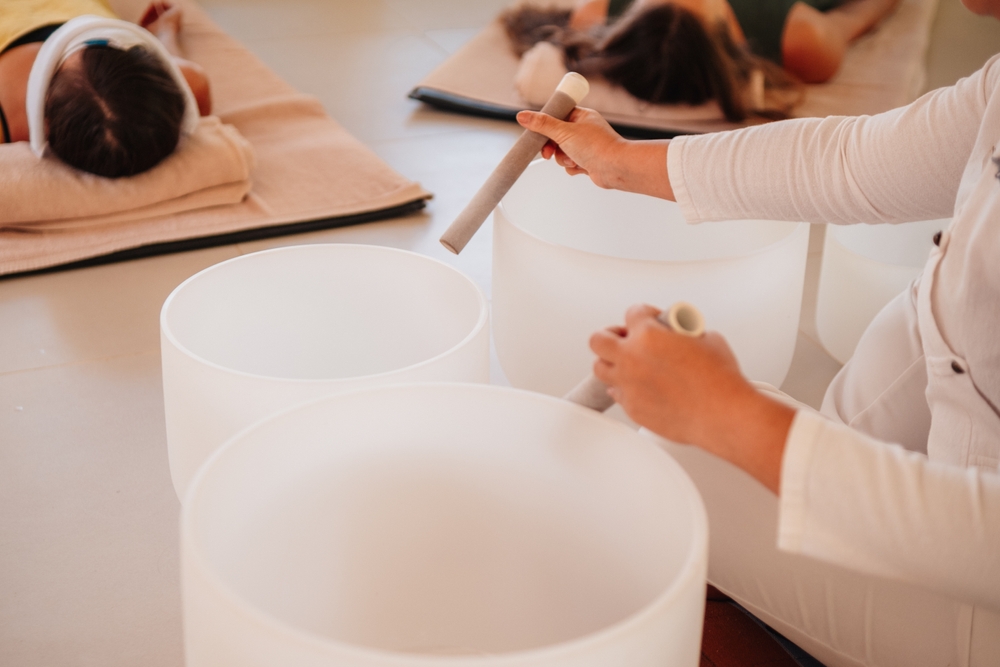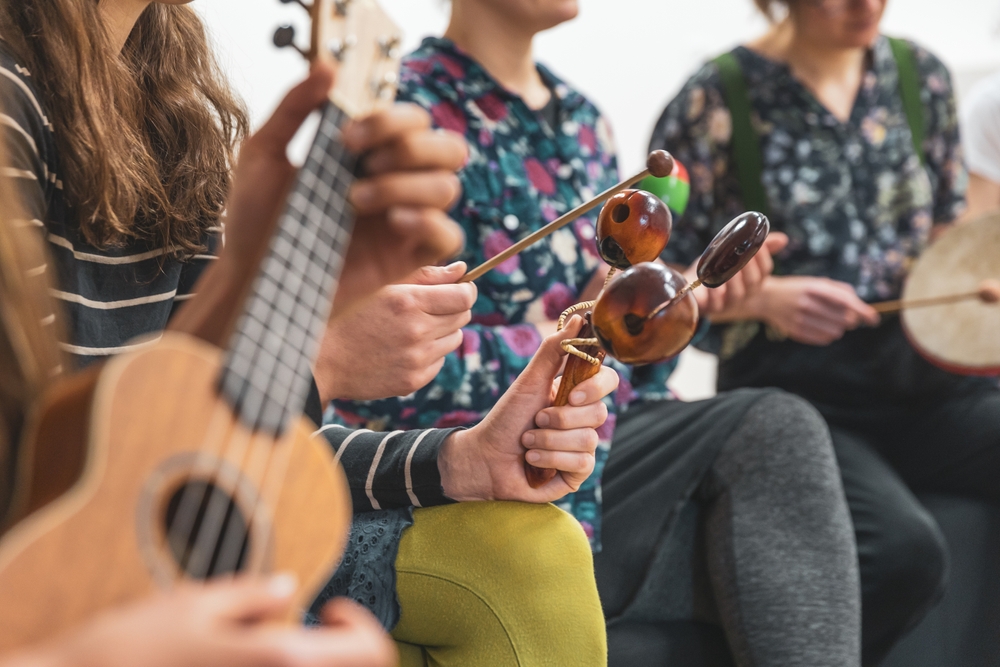Last Updated:
July 21st, 2025
Music Therapy | Addiction Treatment Therapies
When you’re recovering from addiction, words don’t always come so easily. Addiction treatment with music therapy offers another way into your feelings so you can express yourself freely and tell your personal story. You don’t need to be a good singer or know how to play an instrument. Music therapy for addiction is all about connection, emotional release and creativity. On top of all that, music therapy can be a great way to unwind during a tough day in addiction treatment and can even help you avoid relapse long after you leave.

What is music therapy for addiction?
Music therapy is a therapeutic approach included in many rehab programmes to help people express emotions, manage and improve their mood and process difficult experiences, all through the use of music. Music therapy for addiction can be especially helpful if you struggle to open up in traditional talk therapy. During a session, a trained therapist will guide each session based on your comfort level and many people find that even simple musical activities can provide powerful insights and chances for healing.
Music therapy is delivered in a few different ways:
What are the benefits of music therapy in addiction recovery?
Music therapy plays a powerful role in helping people move through the emotional and psychological ups and downs of addiction recovery. Here are some of the key ways it helps:
Music therapy as a tool for overcoming cravings
When cravings hit, the restlessness, itch or voice in your head can be all-consuming. Music therapy can help interrupt that cycle, giving your mind a different path to follow and your body something to do other than act on the craving.
In the middle of a craving, playing music, singing or even drumming out your frustration can all release the built-up energy. Some people write “craving playlists” filled with songs that calm them, distract them or remind them of their reasons for staying sober. Others write mindful lyrics about what they’re feeling in the moment, allowing those emotions to pass.
These aren’t random tricks. They are coping tools that work by helping you stay present. Cravings lose power when you can sit with them and not react, and music is one of the best ways to give yourself that breathing space.
How music therapy promotes emotional healing in addiction recovery
Emotional healing is a crucial part of addiction recovery, but it’s also one of the hardest. Many people carry deep emotional pain that may have been buried under years of substance use. That pain might come from trauma, abuse, loss or simply never having been taught how to deal with emotions healthily. Whatever the case, music therapy can begin to unlock those feelings without forcing you to put them into perfect words.
For example, someone might come into rehab feeling emotionally shut down or unable even to name what they’re feeling. But after improvising on a drum or creating a playlist that mirrors their state of mind, they begin to access emotions that have been frozen for years. In some cases, writing a simple lyric can help someone express guilt or grief they’ve never shared aloud.
Most importantly, music bypasses the thinking part of the brain and taps straight into feeling. It can help you process anger without exploding or feel sadness without drowning in it. For people who have used substances to avoid feeling, music becomes a safe way to start connecting again. With the support of a therapist, that connection then turns into emotional healing.

Aftercare and continued healing with music therapy
Once residential treatment ends, many people are surprised by how vulnerable they still feel. This is because they are no longer surrounded by staff and peers and yet still need to face the emotional challenges of recovery.
As part of your aftercare plan, music therapy gives you an outlet to manage daily stress, process new emotions and stay connected to your recovery goals. You may not have time for daily group therapy anymore, but you can still listen to music that reflects how you feel, write lyrics when your thoughts get jumbled or play an instrument when you need to release tension.
Sometimes, it’s as simple as setting aside time each week to revisit your rehab playlist. These routines help reinforce the emotional work you started in treatment and keep you moving forward.
How to find music therapy for addiction healing near me?
If you are struggling with addiction and need support, Addiction Helper can guide you towards addiction programmes that include music therapy as part of a holistic treatment plan. No matter what addiction you are battling, music therapy can help you express yourself, manage cravings and start healing in a way that feels safe and natural. Contact us today and explore all the best options for addiction treatment with music therapy.
Our compassionate team are ready and available to take your call, and guide you towards lasting the lasting addiction recovery you deserve.
Frequently Asked Questions
Music therapy works well in addiction recovery because it helps people express emotions that are often too painful, confusing or overwhelming to put into words. Many people turn to drugs or alcohol to escape trauma, shame, anxiety or grief, but music provides a safe, non-judgemental outlet for those emotions. The best thing is that you don’t even need to be musical to benefit from it. Simply listening to or creating music can help lower stress, reduce cravings, ease anxiety and make it easier to stay present during tough moments in recovery.
(Click here to see works cited)
- Psychology Today. “Music Therapy.” Psychology Today, https://www.psychologytoday.com/intl/therapy-types/music-therapy. Accessed 26 May 2025.
- American Music Therapy Association. “What is Music Therapy? | What is Music Therapy?” American Music Therapy Association, https://www.musictherapy.org/about/musictherapy/. Accessed 26 May 2025.
- Ghetti, Claire et al. “Music therapy for people with substance use disorders.” The Cochrane Database of Systematic Reviews vol. 2017,3 CD012576. 3 Mar. 2017, doi:10.1002/14651858.CD012576
- UK Rehab. “Holistic Therapy | Rehab Therapies and Models.” UK Rehab, https://www.uk-rehab.com/rehab-therapies/holistic-therapy/. Accessed 26 May 2025.
- UK Rehab. “Music Therapy | Rehab Therapies and Models.” UK Rehab, https://www.uk-rehab.com/rehab-therapies/music-therapy/. Accessed 26 May 2025.

